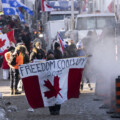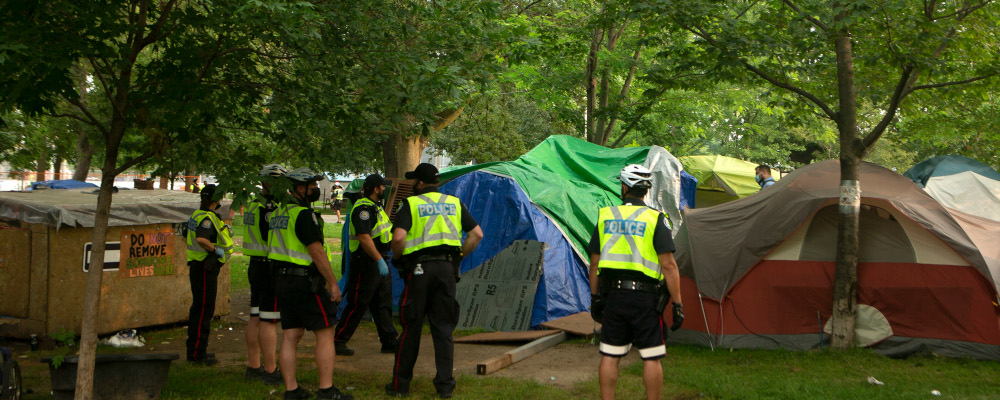Canada’s housing and mental health crisis is obvious to anyone who has seen the sprawling tent cities that have mushroomed in cities across the country. These illegal encampments have been countenanced with controversial enforcement decisions like the Toronto Police Services’ 2021 decision to send in a small army to clear Trinity Bellwoods Park. In that instance, police offered all encampment residents the option to relocate to a hotel shelter; still, homelessness advocates argued that the lack of adequate safety in shelters made it cruel to forcibly clear encampments.
Many residents, meanwhile, support this kind of enforcement. The camps encroach on their ability to access taxpayer-funded public green spaces and for children to safely enjoy playgrounds. Given the prevalence of mental health disorders and substance abuse in the encampments, they present serious threats to community safety. Propane tanks and BBQs are common, creating fire hazards. The hygiene conditions tend to be atrocious.
Not surprisingly, these disputes have wound up in the courts, where a series of questionable legal precedents are being set that threaten to expand the Charter’s ambit to include more so-called “positive rights”—rights that create positive obligations upon the government to act rather than the so-called “negative rights” that the Charter’s drafters had envisioned, which instead require governments to avoid acting in ways the infringe our freedom.
The Coalition for Justice and Human Rights in Alberta is the latest group attempting to create such positive rights where they don’t belong. The coalition has commenced a legal action against the City of Edmonton, claiming the city’s continual displacement of individuals in encampments has placed vulnerable communities in dangerous situations. They say that Edmonton, “despite being aware of the inadequate number of safe and accessible shelter spaces available to a rapidly increasing unhoused population, … continues to displace and destroy encampments with nowhere for people to go”. They argue that this enforcement is not only dangerous but violates several Charter rights, including s. 7 (life, liberty and security of the person), s. 12 (cruel and unusual punishment), and s. 15 (equality).
While the claim is immediately seeking an injunction against forcibly clearing encampments, the underlying issue is the government’s ability to adequately provide shelter beds, they say. While the Coalition does not deny that the police have the jurisdiction to clear illegal encampments from public spaces, they submit that doing so within the context of a shelter shortage is a violation of constitutional rights.
This type of argument succeeded in January when a judge of the Ontario Superior Court found Waterloo Region’s decision to clear illegal encampments violated a “right to shelter” which he had deciphered from previous section 7 jurisprudence. Citing a line of case law that has developed over the last few years in B.C., Justice Valente held that there was a right “to shelter oneself when the number of homeless persons exceed the number of available and accessible indoor shelter spaces within a given jurisdiction.” The idea seems to be that although there is no positive right to shelter, when there aren’t enough beds in homeless shelters or public housing available the City is interfering with the security of the person by making people pack up their tents since that creates a risk to bodily integrity.
The reason the ruling was framed in this roundabout way—as a negative right not to be put at greater risk of physical harm by cities who make you move your tent rather than a positive right to shelter—is because there is already clear legal precedent that a positive right to shelter does not exist. But it is merely a positive right claim in disguise. In the 2014 decision in Tanudjaja v Canada, the Ontario Court of Appeal found that a claim by a coalition of applicants that actions and inaction on the part of Canada and Ontario resulted in homelessness and inadequate housing was not even justiciable. The Court underscored that the government had no positive legal obligation to provide equitable housing and that the dispute was for policymakers to resolve.
The proscription against finding positive legal obligations under the Charter was also emphasized in 2002’s Gosselin v Quebec, where the Supreme Court of Canada rejected an argument that s. 7 of the Charter requires the provision of a minimum level of social assistance adequate to meet basic needs. There are good reasons for this. The judiciary is not democratically accountable and not representative of the local community or political spectrum. It may not levy taxes nor formulate budgets. The notion of a court dictating to governments the precise number of shelter beds they must provide in order to avoid running afoul of the Constitution effectively inserts the judiciary within the dynamic activity of governing

Asserting a constitutionally protected right to shelter is not only doctrinally questionable, it’s also impractical. In New York City, the City has had a “right to shelter” policy since the 1980s. The policy mandates the City to provide a bed for anyone who requests one. But it hasn’t worked. That policy is currently beleaguered due to a high influx of migrants exceeding the city’s shelter capacities. The City has apparently decided that “right to shelter” or not, there are limits to how many people taxpayers can afford to house.
New York’s current shelter space crisis exemplifies why it is governments and not the judiciary that can rightfully commit itself to a policy as onerous as a “right to shelter”: it is the City that must assess whether to slash other social programs, request federal funding, raise taxes, or decide the policy is simply no longer viable. None of which are powers judges possess. The Charter is a classical liberal document that grants individuals rights against the state: to refrain from interfering with an individual’s right to express herself, move about, exercise free conscience, and be free from discrimination. Judges are well positioned to play referee when government actions wade into private life without sufficient justification. They are very poorly positioned to decide how best to resolve complex policy debates.
Recommended for You

Why extortion in Canada has surged in B.C., Alberta, and Ontario

Why Indigenous ‘Reconciliation’ must have a finish line

How can Canada have a housing shortage while homes sit unsold?

Does anyone in Canada care about the Constitution?




